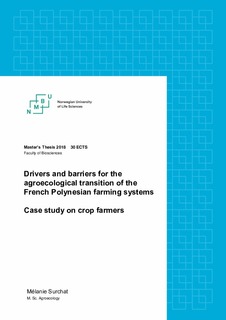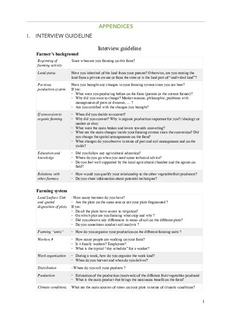| dc.description.abstract | In recent years, the quality of French Polynesian agricultural production has been increasingly criticised by consumers, who are concerned about pesticide residues in vegetables. Parallel to that, farmers are accused of increasing soil erosion with their “bad farming practices”. These critics are difficult to validate as there is insufficient information available concerning the farmers’ practices. Therefore, this works seeks to answer two questions: To which extent do farmers use “agroecological practices” that reduce erosion and dependence on agrochemicals? What are the factors or forces supporting or hindering the implementation of “agroecological practices”? A qualitative work has been conducted with 20 farmers interviewed on four different islands in the Society Archipelago in French Polynesia, following an agroecological analytical framework. After describing the different farming practices and evaluating their alignment to an agroecological approach, four major types of farmers were established: organic, reasoned, traditional and conventional. These types combine similar management practices determined by their socio-economical environments. After articulating the major barriers for each farmer type, potential drivers leading to a broader implementation of “agroecological practices” were underlined. Results show that “agroecological practices” are used by a vast majority of farmers for erosion mitigation and pest management, with an important crop diversity leading to biological pest regulation. Management of soil fertility is far from an agroecological approach, with use of mostly synthetic fertilisers and herbicides. The “reasoned farmer type” have been identified as the target group to push forward the agroecological transition of the farming systems, being the most innovative. Researchers should work hand in hand with these farmers to further evaluate the technical and economic feasibility of implementing “agroecological practices”. Finally, results highlight additional requirements for the agroecological transition such as increasing research on organic management of vegetable production, improving market valorisation for organic products, giving access to small machinery for the resource-poor farmers, promoting agricultural training to improve soil fertility management and raising consumer awareness. | nb_NO |


